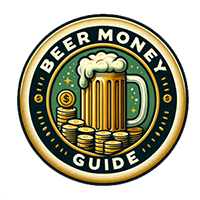In today’s world, the idea of making money easily is tempting. But, it’s important to be careful with online money-making chances. Scammers pretend to be from places like the Federal Trade Commission or big companies to trick people.
They use smart tricks like changing caller ID and making fake websites. This makes them seem real and safe.
Scammers often rush you to act fast. They say you must do something right now to get a prize or fix a problem. They might ask for money in ways like cryptocurrency or gift cards, which are hard to get back.
They also ask for your personal or money details. This can lead to identity theft and losing money.
To stay safe, be careful and take steps to protect yourself. Block unwanted calls and messages. Never give out personal or money info without checking it’s real.
If something feels off or too good to be true, listen to your gut. Don’t go any further with it.
Our Main Points
- Scammers often impersonate representatives from reputable organizations to lure victims.
- Beware of urgent demands and specific payment methods, as these are common tactics used by fraudsters.
- Protect your personal and financial information by blocking unwanted communications and never sharing sensitive data.
- If an opportunity seems too good to be true, it’s likely a scam, so trust your instincts and avoid engaging further.
- Reporting suspected scams to the FTC can help prevent others from falling victim and potentially recover lost funds.
Understanding the Growing Threat of Online Money-Making Scams
In today’s world, online scams are a big problem. They threaten our safety and money online. Scammers find new ways to trick people who want to make extra cash.
Common Types of Financial Fraud
There are many scams out there. Money mule schemes, online dating scams, and impostor scams are common. These scams can steal your identity and money, causing a lot of harm.
Why Scammers Target Money-Making Platforms
Scammers like money-making sites because they can make a lot of money. More people are looking for ways to earn extra. This makes these sites a big target for scammers.
Current Statistics and Trends
In 2023, online fraud hit a record high. Over 880,000 people lost money to scams, with losses over $12.5 billion. It’s very important to protect your money and learn about money online to stay safe.
| Scam Type | Impact | Key Findings |
|---|---|---|
| Online Dating Scams | Over 64,000 victims with a median loss of $2,000 per victim | Online dating scams were the highest loss among imposter scams in the previous year. |
| Job Offer Scams | 7.2 million unemployed workers, making them a prime target | Job offer scams increased during the COVID-19 pandemic, with a notable rise in unsolicited offers via email. |
| Charity Scams | Spike after major natural disasters or conflicts, preying on people’s goodwill | Charity fraud scams often target individuals’ compassion and desire to help during difficult times. |
Online scams are getting worse. It’s very important to stay careful and protect your safety and money online.
How to Spot and Avoid Scams on Money-Making Sites
In today’s world, it’s very important to watch out for scams online. Scammers keep coming up with new ways to trick people. Knowing how to spot scams can help keep you safe.
One big warning sign is getting emails or messages you didn’t ask for. They might promise you easy money. But, these are often tricks to get your personal info or make you click on bad links.
Also, be careful of ads that say you can make a lot of money from home. They might ask you to pay for “training” or “access” first. This is usually a scam.
Keeping up with the latest online threats is key. Websites like the Cybersecurity and Infrastructure Security Agency (CISA) can help. Also, use strong passwords, update your software, and use security tools to stay safe.
| Year | Crypto Scam Victims | Crypto Scam Losses |
|---|---|---|
| 2022 | 300,000+ | $52.1 million |
| 2023 | 298,000 | $18.7 million |
By being careful and knowing the signs of scams, you can safely explore online money-making sites. This way, you can avoid getting tricked by scammers.
Red Flags in Job Opportunities and Business Propositions
As the threat of Online Fraud Prevention and Identify Fraudulent Websites grows, stay alert. Scammers target job seekers and entrepreneurs with fake promises. They say you’ll make a lot of money and make false claims.
Unrealistic Income Promises
Watch out for jobs or businesses that promise too much money. Real jobs don’t offer huge paychecks for working from home. If it sounds too good, it probably is a scam.
Pressure Tactics and Urgency
Scammers push you to decide fast. Real businesses let you think about it. Feeling rushed? It might be a scam.
Requests for Upfront Payments
Don’t pay for training or access before starting a job. Real employers don’t ask for money. Paying upfront is a scam sign.
Protect yourself by researching companies and reading reviews. Look for complaints. Being careful helps avoid scams in Online Fraud Prevention and Identify Fraudulent Websites.
Common Tactics Used by Online Scammers
In today’s world, scammers have found new ways to trick people online. They use phishing attacks and romance scams to get your personal and money details.
They make fake profiles on dating apps or social media. They build trust, then ask for money for fake emergencies or investments. They might pretend to be from the government or a company you know.
Scammers try to scare you into acting fast. They say you’ll face legal trouble if you don’t do what they say. They can even make it look like a real call from a trusted place.
They also use money mule schemes. They ask you to open bank accounts or move money for them. This can get you into big trouble with the law.
To stay safe, be careful with strangers online. Always check if someone is real before giving them your info. If something feels off, it probably is.
Protecting Your Personal and Financial Information
In today’s world, keeping your personal and financial info safe is key. Scammers are always finding new ways to trick people. So, it’s important to be careful and take steps to protect your money and financial literacy.
Secure Password Practices
Strong, unique passwords are your first defense against online scams. Don’t use easy-to-guess info like birthdays or pet names. Use a password manager to keep complex, random passwords safe.
Two-Factor Authentication Benefits
Turning on two-factor authentication (2FA) adds extra security. It makes it hard for scammers to get into your accounts. This simple step helps keep your important info and money safe.
Safe Banking Practices
Be careful with your banking. Don’t click on links or share personal info in emails you didn’t ask for. Always check if a website is real before giving out sensitive info. Also, watch your account statements for any odd activity.
By following these tips for financial literacy and protecting your money, you can lower your risk of scams. This helps keep your personal and financial info safe.
Legitimate vs. Fraudulent Money-Making Opportunities
Finding real money-making chances online is key. Legit ones don’t ask for money upfront or promise too much. They share clear info about the job and pay.
Scams, on the other hand, hide details, push hard to sell, and ask for personal info. It’s vital to know the difference.
To find real chances, research well. Check with the Better Business Bureau and read online reviews. Look for clear info and no pushy sales.
Scams have red flags:
- Too-good-to-be-true income promises
- Urgency to buy now
- Ask for money or personal info first
Always check out any chance before spending time or money. Keep your info safe to avoid scams.
Stay alert and know the real from fake online. This way, you can safely find ways to make money.
Steps to Take If You’ve Been Scammed
If you’ve been scammed, act fast to protect yourself. You need to report it, try to get your money back, and look into legal help.
Reporting Procedures
Stop talking to the scammer and don’t send any money. Then, tell your bank, local police, and the Federal Trade Commission (FTC) at ReportFraud.ftc.gov. This helps catch the scammers and stops more scams.
Recovery Options
If your info was stolen, go to IdentityTheft.gov to make a plan. Call the big three credit places (Equifax, Experian, TransUnion) to put fraud alerts on your reports. This makes it tough for thieves to use your name.
Legal Resources
For legal advice, talk to legal aid or fraud lawyers. They can tell you about your rights and how to get your money back.
Act fast to fight back against scams. Report it, protect your info, and look into legal help. This way, you can lessen the harm and avoid more scams.
Essential Tools and Resources for Scam Prevention
Staying safe online is very important. There are many tools and resources to help you. These can keep your money safe and make the internet safer for you.
First, check the Federal Trade Commission’s (FTC) Consumer Alerts often. Also, look at the FDIC’s Consumer News and the Cybersecurity and Infrastructure Security Agency’s (CISA) cybersecurity alerts. These sites give you the latest info on scams. This helps you avoid fraud.
Next, get good antivirus and firewall software. These tools fight off bad stuff online. They keep your devices and personal info safe.
- Use secure password managers to make strong, unique passwords. This makes it hard for scammers to get into your accounts.
- Turn on automatic software updates. This keeps your devices and apps safe from new threats.
- Think about using a virtual private network (VPN) when you’re online. It adds extra security to your browsing.
It’s important to stay informed. Visit government sites and consumer protection groups often. This way, you can learn about new scams and how to avoid them. Using these tools and resources helps keep your Internet Safety and Protect Your Money from online scams.
| Resource | Purpose |
|---|---|
| Federal Trade Commission (FTC) Consumer Alerts | Provides the latest information on consumer scams and fraud |
| FDIC Consumer News | Offers guidance on banking and financial safety |
| CISA Cybersecurity Alerts | Issues warnings and recommendations on cyber threats |
| Antivirus and Firewall Software | Detects and prevents malware to protect devices and data |
| Password Managers | Generates and stores secure, unique passwords |
| Virtual Private Networks (VPNs) | Encrypts online activities for enhanced privacy and security |
Conclusion
It’s important to stay alert and know about online scams. Keep your computer safe and don’t trust deals that seem too good. Legit opportunities won’t rush you or ask for money first.
Learning about financial literacy and online fraud prevention helps a lot. Real sites are clear, keep your info safe, and pay fairly. Scammers lie, trick you, and want your personal info.
The digital world is getting bigger. So, it’s key to be smart and careful with your money. Watch out for warning signs and use strong security. This way, you can find real ways to make money without falling for scams.


Ryan Conlon is the founder and owner of Beer Money Guide, a comprehensive resource dedicated to helping people discover the best ways to earn extra cash online.
With a passion for exploring the digital landscape and a knack for finding lucrative opportunities, Ryan has turned his experience into a trusted guide for anyone looking to boost their income through legitimate online platforms.
When he’s not hunting down the latest money-making apps, Ryan enjoys sharing tips and strategies to help others achieve their financial goals.
Subscribe to Our Newsletter
The information on this website is for general purposes only and is not a substitute for professional financial advice.
Always consult a financial professional before making decisions.







